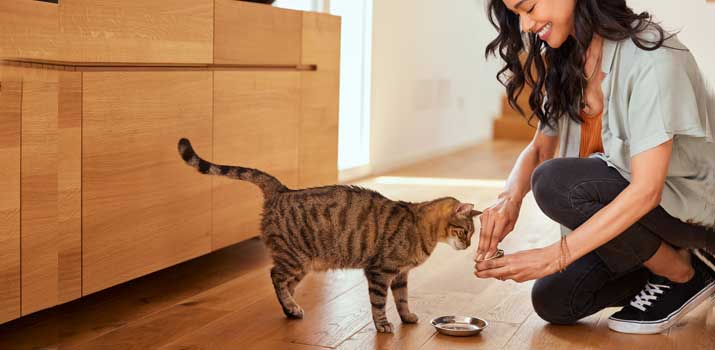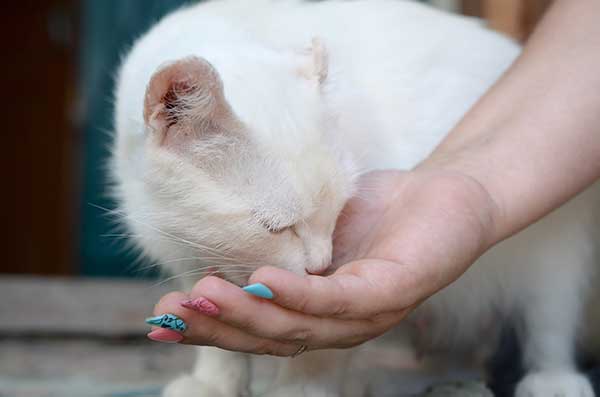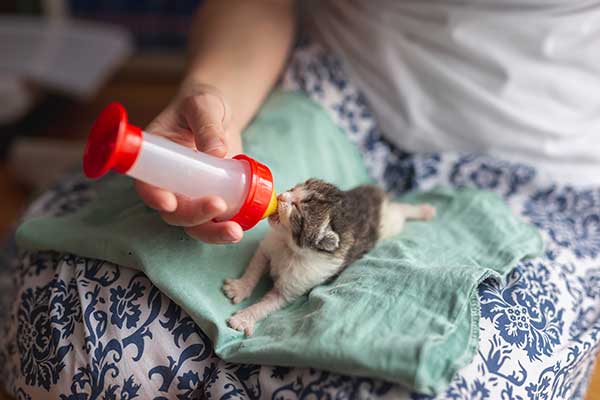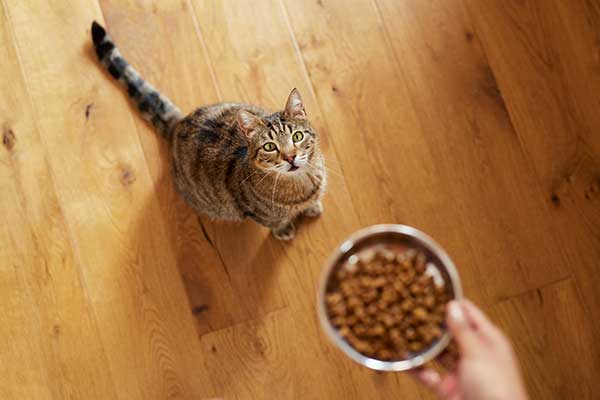Have you ever noticed your cat waiting to eat until you’re sitting with them? Instead of going off and eating in private, they insist that you stay nearby, refusing meals until you’re ready to keep a watchful eye as they chow down.

Cats are capable of many oddball behaviors, but this one takes the cake!
For most animals, eating is a precious time. While domesticated animals do not need to worry about where they get their next meal, most treat it as if it is their last!
As a result, protective behavior and resource guarding become significant issues. But that’s often not the case with cats. They want you to watch them eat. Some even go so far as to request pets and physical affection.
But why?
This behavior is just one of the many ways cats are unique to dogs and other household pets. But is it something you should worry about, or is it an act you can let slide?
Before you determine any course of action, it’s a good idea to familiarize yourself with some of the reasons why cats do this. Getting into your feline friend’s head can provide some much-needed insight into their thoughts and feelings.
All About Affection Eating
Here’s something you probably didn’t know: There’s a name for your cat’s odd behavior. It’s called affection eating.
Affection eating can occur in many animals, but it’s surprisingly common in felines. Essentially, it’s a habit of eating better whenever a human companion is around.
Cats who practice affection eating might need you to be in the same room as them before they start eating. However, affection eating also includes the need to have encouragement.
For example, your cat might want you to direct them to their bowl, shake the kibble to make noise, or touch the food. More on that later.
This habit is unique and can be troublesome. In the beginning, it’s a cute quirk that you might find endearing. But at some point, it’ll become a real issue.

What if you go away for the weekend and put your cat into boarding? What about emergency situations when you’re unable to be there to feed your cat?
In those instances, affection eating can be dangerous. Cats need to learn how to eat on their own to remain healthy.
While it’s a beautiful thing in terms of creating a bond with your pet, it’s not practical long-term. Whether or not you address it is up to you, but most vets recommend training your cat to let go of affection eating to some extent.
Why Your Cat Wants You To Watch Them Eat
Cats are complex creatures. We’ll never really know what they’re thinking. However, we can use our knowledge of cat psychology to get a pretty good understanding of why cats want you to watch them as they eat.
Here are some of the most commonly accepted reasons.
A Force of Habit
In many cases, the need to have you around is simply up to habit!
Domesticated cats still have some of the instincts of their wild ancestors. But many would consider them an entirely different breed of animal. A big part of that comes down to their connections with humans.
Think back to your cat’s youth. Did you find them as a kitten and nurse them to health? Did you baby them and feed them with a syringe? If so, there is your answer to why your cat needs you to watch them eat today!
Caring for kittens is a beautiful experience. Young felines need a lot of help staying healthy, and loving humans like yourself are more than willing to take up that mantle. For your cat, the experience is about more than just staying alive. It’s a time when they created a strong bond with you.
It’s a bond that’s unbroken today! The need to have you near when they eat is simply a carried-over habit of their youth.
You might notice this behavior occurring even if you had no hand in your cat’s upbringing. Maybe the breeder you adopted them from hand-fed them with a bottle or syringe.

Alternatively, they could have had an audience of onlookers anytime they fed on their mother’s teet!
Whatever the case may be, that feeling they got from it stuck. Your cat’s current behaviors are simply a way to recreate those memories. They’re used to it, and they’ll likely continue to do it until you take action.
As long as everything else about your cat is normal, there’s no significant cause for concern here. However, getting your cat to abandon this behavior will be more challenging. It’s an ingrained habit that will take a lot of work to change.
A Sign of Trust and Affection
Have you ever tried sneaking up on your cat? While you might get lucky every once in a while, your feline friend is more attuned to their surroundings than you think!
Cats are very observant of their environment. They want to stay alert at all times just in case something happens that requires them to act fast.
Despite that vigilance, there are two occasions when cats are pretty vulnerable:
When they eat and when they use the litter box.
A closed-off litter box is enough to make cats feel safe when they do their business. But when they eat? That’s where you come in!
In many cases, a cat’s need for you to be around is all about trust. They trust you enough to watch their back as they eat. Consider it an indicator of how strong your bond is.
Your cat wants you there so that it can feel safe being vulnerable and eating. If you’re not, they don’t want to eat. It’s as simple as that!
Keeping Up with the Action
Sometimes, cats wait for you to watch them eat because they don’t want to miss any moment of the action.
While some cats are keener on social interaction than others, there’s no denying that they like to stay abreast of what’s going on in their surroundings.
You might notice your cat stopping eating mid-meal to look up at you or scan the room. It’s their way of making sure that nothing fun is happening without them!
When you’re actively watching your cat eat, you’re not doing anything else. So, some felines will wait until they have your undivided attention! That way, there’s no chance that they miss out on any fun moment!
The Fear of Being Alone
Here’s a potential reason for your cat’s strange behavior that stems from something a little darker.
Cats are pretty tough animals. But they’re still vulnerable and sensitive animals in the grand scheme of things. If your cat ever experienced something negative while eating in the past, that incident could be haunting them today.
It doesn’t have to be a big event.
Seemingly innocent experiences can leave a lasting impression, such as getting caught off guard while eating. It reminds them of their exposure while eating. If your cat ever got attacked or had its food stolen, the impact of that event is even more significant!
Whatever the case might be, your cat is dealing with fear. They’re scared to eat and need you to be by their side for support.
Once again, this is a good sign of your strong bond. Your cat trusts you to protect them and feels safe enough to face their fears when you’re around. However, this isn’t something you should ignore.
We recommend getting help from a behaviorist or trainer to help your cat overcome its fears. Otherwise, this problem could graduate to something worse.
Discomfort or Illness
Finally, your cat could be suffering from an illness that’s preventing them from eating normally.
This is common among older cats that suffer from diseases and physical ailments. It’s not something that any cat owner wants to think about, but it’s a harsh reality we have to face.
The issue here is a combination of fear and a changing appetite. Diseases often make cats feel on edge. In that case, they turn to you for comfort and support. You’re their rock, and they want you to be around to ensure that their food is safe.
Some cats don’t eat because they lack the energy and appetite to do so. Of course, seek veterinary care if you suspect the illness is to blame.
Many veterinary care professionals see success with hand feeding. Your vet might recommend trying that as they tackle the health issues.
Related: What Should I Feed a Hyperthyroid Cat?
What About Similar Behaviors?
Having your cat wait to eat until you look at them is odd enough. But it’s not the only strange food-related behavior you might see.
Cats often like to make a show of eating their meals. In addition to waiting for your company, they might ask you to touch the food or walk them to it!
It’s a bit of spoiled behavior that can undoubtedly cause you to scratch your head. Many cat owners don’t realize what their cat wants until they experiment with techniques.
So, what’s the deal?

When it comes to guiding your cat to meals, this is all about making sure you stick around. Your kitty might not even acknowledge their food until you walk with them or snap your fingers and point to the meal. The over-the-top display is about getting your undivided attention.
It’s your cat’s way of asking for protection. They know that you’ll guide them to the food and watch them eat. So, your cat might wait until you do all that before they even consider eating.
The same goes for touching food. Have you ever played dry kibble in your hand to attract your cat? You might think that the sound of the food hitting the bowl is what does the trick. In reality, your mere touch is all your cat needs!
In addition to grabbing your attention, this behavior provides peace of mind for your cat. You’re essentially testing the food and making sure it’s safe. Once you do that, your cat is comfortable enough to chow down!
Is It Safe to Pet a Cat While It’s Eating?
Another weird request is petting.
Whether or not you should pet your cat depends entirely on your relationship and your feline friend’s personality. Some cats detect touch.
Remember: They’re pretty vulnerable as they eat. As a result, some cats will get scared and potentially violent if you attempt to touch them as they eat.
However, others welcome it. Some won’t even nibble their food unless you’re there stroking their back.
If that’s the case for your cat, you should probably turn to a trainer for help. The good news is that your cat loves you enough to want your affection and attention.
Those strokes help your cat feel safe. Veterinarians and those working in shelters often pet cats to help ease their anxiety as they eat.
But the bad news is that the behavior is entirely unnecessary. Your home is likely safe and secure, so there’s no reason your cat should turn to you for additional comfort. You want them to feel safe no matter what, right?
It’s not a great idea to indulge in this behavior too much. Otherwise, your cat can become reliant on it.
Related: Why Is My Cat Drinking a Lot of Water and Meowing?
Should I Put a Stop to This Behavior?
Whether or not you choose to do something about this weird eating requirement is up to you. Of course, you should always seek professional help if you feel that it’s a product of fear or health concerns. But outside of that, it’s a pretty innocent thing.
The only thing to consider is how realistic it is. Are you available to watch your cat eat every meal of their life? Chances are: You’re not.
You must think about how your cat can overcome the issue when you’re not around. The last thing you want your cat to starve themselves when you’re on vacation! For this reason, it’s worth exploring ways to shake this habit.
How to Encourage Your Cat to Eat Independently
Professional trainers and behaviorists can do a lot to help your cat overcome the need to have you around as they eat. That said, there are a few things you can do by yourself, too.
The most important thing is to make your cat feel safe. That may require you to change eating routines or even feed your cat in a different room.
Eliminate anything that could scare your cat. That means putting other pets in a different space and turning off anything that could make sudden loud noises.
Feed your cat in an open room and choose a feeding spot with relatively good visibility. Ideally, the location should give your cat a full view of the surroundings as they eat.
If you’re having trouble finding the perfect spot, let your cat choose. Provide multiple food bowls and let your cat decide which one they want to eat out of every day. Once you see a pattern, you can narrow things down to a comfortable spot.
Consider an elevated feeder if you want to provide even more peace of mind. Lifting the bowl a few inches off the ground gives your cat a much wider field of view as they eat.
When feeding your cat, stay in the room and watch them eat. But over time, move farther and farther away from them. Eventually, you can slink out of the room. As long as your cat feels safe and at peace, they can learn to eat without your constant gaze.
A Final Word
Cats are always an enigma. They can be super flighty and unpredictable one minute, then needy the next! When your cat wants you to watch them eat, it’s likely because they feel unsafe and want you to protect them.
Your presence is important to your cat, and they need it to feel safe. Understanding where this behavior comes from goes a long way. It can help you create a safer eating environment and give you the tools to encourage your cat to be more independent.
Also Read:
- Why Your Cat Won’t Eat Wet Food
- What Do Cats Like to Eat for Breakfast?
- Can Cats Eat Pork?
- 10 Scents that Repel Cats

